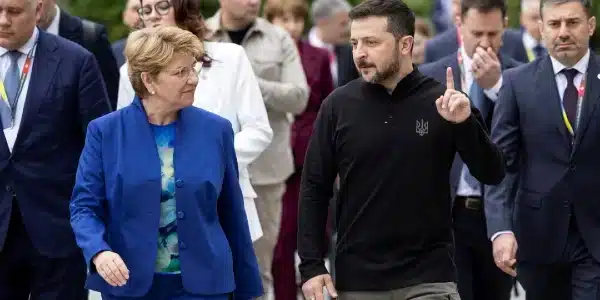A two-day summit in Switzerland aimed at finding a way to end the war in Ukraine concluded with key nations abstaining from a joint communique agreed upon by over 80 other countries and international organizations.
India, Saudi Arabia, South Africa, and the United Arab Emirates, all of whom have significant trading ties with Russia as members of the BRICS economic group, attended the meeting but did not sign the joint statement.
The document reaffirmed the signatories’ commitment to “refraining from the threat or use of force against the territorial integrity or political independence of any state,” and emphasized the principles of sovereignty, independence, and territorial integrity of all states, including Ukraine, within their internationally recognized borders.
Ukrainian President Volodymyr Zelensky, speaking at a news conference with leaders from the European Union, Ghana, Canada, Chile, and Switzerland, emphasized the importance of all summit participants supporting Ukraine’s territorial integrity, stating, “There will be no lasting peace without territorial integrity.”
More than 100 countries and organizations gathered at a scenic resort near Lucerne to rally support for Zelensky’s 10-point peace plan, which he first presented in late 2022. The plan includes demands for a cessation of hostilities, restoration of Ukraine’s territorial integrity, withdrawal of Russian troops, and reinstatement of Ukraine’s pre-war borders with Russia—terms unlikely to be accepted by Russian President Vladimir Putin.
High-level attendees included leaders from Argentina, Canada, Denmark, Finland, France, Germany, Italy, Japan, the Netherlands, Poland, Sweden, and the United Kingdom. U.S. Vice President Kamala Harris also attended and announced a $1.5 billion aid package for humanitarian needs and infrastructure rebuilding in Kyiv.
“This high-level attendance shows one thing: the world cares deeply about the war provoked by Russia’s aggression,” said European Commission President Ursula von der Leyen.
Despite the strong presence of Western democracies, there were questions about what could be achieved given the absence of Russia and China, whose close trading relationship with Moscow has helped the Kremlin withstand Western sanctions.
The communique published on Sunday stated that signatories had reached several agreements. These included affirming Ukraine’s right to its nuclear power plants—including the Russian-occupied Zaporizhzhia Nuclear Power Plant—and calling for the Kremlin to refrain from using or threatening nuclear weapons. They also agreed that all children and civilians unlawfully displaced must be returned to Ukraine.
On Friday, before the summit began, Russian President Vladimir Putin reiterated the Kremlin’s peace plan, which calls for Ukrainian troops to withdraw from four southern and eastern regions of Ukraine that Moscow claims to have annexed in violation of international law. Putin also demanded that Kyiv abandon its bid to join NATO.
While Russian forces have made modest gains in the Donetsk and Luhansk regions, they are far from occupying all four regions, which also include Kherson and Zaporizhzhia.
U.S. National Security Advisor Jake Sullivan, who accompanied Harris to Switzerland, told reporters that Putin’s framework “defies basic morality.”
“He (Putin) said, not only does Ukraine have to give up the territory Russia currently occupies, but Ukraine has to leave additional sovereign Ukrainian territory before Russia will negotiate. And Ukraine must disarm so that it is vulnerable to future Russian aggression. No responsible nation could say that is a reasonable basis for peace,” Sullivan said.


